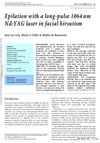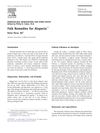 51 citations,
July 2010 in “Trends in Endocrinology and Metabolism”
51 citations,
July 2010 in “Trends in Endocrinology and Metabolism” Prolactin may play a significant role in skin and hair health and could be a target for treating skin and hair disorders.
2 citations,
January 1994 in “PubMed”  1 citations,
January 2019 in “Skin Pharmacology and Physiology”
1 citations,
January 2019 in “Skin Pharmacology and Physiology” Eplerenone, a mineralocorticoid receptor antagonist, was found to promote hair growth in human hair follicles.
 2 citations,
November 2017 in “Journal of Cosmetic Dermatology”
2 citations,
November 2017 in “Journal of Cosmetic Dermatology” Injecting platelet-rich plasma under the skin significantly improves hair growth and quality without harmful effects.
 44 citations,
July 1990 in “Journal of the American College of Cardiology”
44 citations,
July 1990 in “Journal of the American College of Cardiology” Captopril reduces heart mass, while minoxidil has opposite effects and side effects.
 24 citations,
January 2010 in “Annales d'endocrinologie”
24 citations,
January 2010 in “Annales d'endocrinologie” For women with moderate to severe unwanted hair growth or acne, birth control pills are the first choice, with other medications like cyproterone, spironolactone, flutamide, or finasteride as alternatives, and permanent hair removal should be done with electrolysis or laser.
 88 citations,
February 2008 in “Journal of Medicinal Chemistry”
88 citations,
February 2008 in “Journal of Medicinal Chemistry” Scientists made the first metal-based compounds from a nonsteroidal antiandrogen drug, which showed potential in fighting both hormone-dependent and independent prostate cancer cells.
 11 citations,
September 1997 in “Archives of Dermatology”
11 citations,
September 1997 in “Archives of Dermatology” Reduced androgens linked to kinky hair disorder and hair loss; 5a-reductase inhibitors may help.
 19 citations,
January 2001 in “Journal of cutaneous laser therapy”
19 citations,
January 2001 in “Journal of cutaneous laser therapy” The Nd:YAG laser safely reduces facial hair and slows regrowth, with patient satisfaction.
 31 citations,
December 2002 in “Biochimica et biophysica acta. G, General subjects/Biochimica et biophysica acta. General subjects (Online)”
31 citations,
December 2002 in “Biochimica et biophysica acta. G, General subjects/Biochimica et biophysica acta. General subjects (Online)” The research found two types of calcium in human hair, one that varies among individuals and another that is consistent across people.
 1 citations,
June 2013 in “Clinics in dermatology”
1 citations,
June 2013 in “Clinics in dermatology” Herbs may be safer and effective for treating hair loss.
 December 2023 in “Oxford medical case reports”
December 2023 in “Oxford medical case reports” Standard treatment for congenital erythropoietic porphyria was ineffective over five years.
 May 2011 in “Expert Review of Endocrinology & Metabolism”
May 2011 in “Expert Review of Endocrinology & Metabolism” Breast cancer survivors may have a higher risk of falls, tamoxifen could prevent breast cancer and deaths, new guidelines urge caution with prostate cancer therapy, and early balding in men may indicate a higher prostate cancer risk.
 24 citations,
July 2016 in “Revue Neurologique”
24 citations,
July 2016 in “Revue Neurologique” Gilles de la Tourette syndrome is treatable, with behavioral therapy as a recommended first option and other treatments available for more severe cases.
 February 2015 in “Current problems in dermatology”
February 2015 in “Current problems in dermatology” The document provides a comprehensive guide for dermatologists to diagnose and treat hair loss.
53 citations,
June 2019 in “JEADV. Journal of the European Academy of Dermatology and Venereology/Journal of the European Academy of Dermatology and Venereology” Frontal fibrosing alopecia mainly affects postmenopausal women and may be linked to thyroid hormones.
 165 citations,
September 2001 in “Genes & development”
165 citations,
September 2001 in “Genes & development” CDP is crucial for lung and hair follicle cell development.
 February 2011 in “Annales de dermatologie et de vénéréologie”
February 2011 in “Annales de dermatologie et de vénéréologie” Tofacitinib shows promise for treating severe alopecia areata with good safety and effectiveness.
 11 citations,
November 1982 in “British journal of dermatology/British journal of dermatology, Supplement”
11 citations,
November 1982 in “British journal of dermatology/British journal of dermatology, Supplement” Testosterone and some of its forms can strongly stimulate oil gland growth in skin.
 57 citations,
February 1983 in “The Journal of clinical endocrinology and metabolism/Journal of clinical endocrinology & metabolism”
57 citations,
February 1983 in “The Journal of clinical endocrinology and metabolism/Journal of clinical endocrinology & metabolism” Dihydrotestosterone increases the activity of an enzyme in pubic skin cells that converts testosterone to dihydrotestosterone.
25 citations,
January 1983 in “Archives of dermatology” The conclusion is that Darier-White disease was accurately described by White but he missed the key feature of dyskeratotic cells which Darier identified.
 November 2024 in “Journal of Clinical Medicine”
November 2024 in “Journal of Clinical Medicine” The treatment improved hair thickness, shine, and reduced hair loss effectively.

research Skin
August 2022 Goat hair growth is influenced by light cycles and diet, and skin diseases in goats are diagnosed through a step-by-step process and often involve viral or bacterial infections.
 January 2015 in “Dermatology”
January 2015 in “Dermatology” The document covers various dermatological treatments and conditions.
 1 citations,
September 2018 in “European Journal of Cancer Prevention”
1 citations,
September 2018 in “European Journal of Cancer Prevention”  47 citations,
September 2022 in “European Heart Journal”
47 citations,
September 2022 in “European Heart Journal” Women may need different blood pressure guidelines than men for heart disease prevention.
 47 citations,
December 2000 in “Archives of Dermatological Research”
47 citations,
December 2000 in “Archives of Dermatological Research” Androgens significantly affect female hair loss, and hormonal treatments may help.
 5 citations,
September 2012 in “Springer eBooks”
5 citations,
September 2012 in “Springer eBooks” Nanoparticles can be used to deliver drugs to hair follicles, potentially improving treatments for conditions like acne and alopecia, and could also be used for vaccine delivery and gene therapy.
13 citations,
September 2022 in “Biomolecules” The research confirms that Hidradenitis Suppurativa is characterized by increased inflammation, disrupted skin cell organization, and abnormal metabolic processes.
 87 citations,
December 2016 in “British journal of dermatology/British journal of dermatology, Supplement”
87 citations,
December 2016 in “British journal of dermatology/British journal of dermatology, Supplement” Cancer patients treated with immune checkpoint inhibitors may develop alopecia, but some hair regrowth is possible with treatment.


























